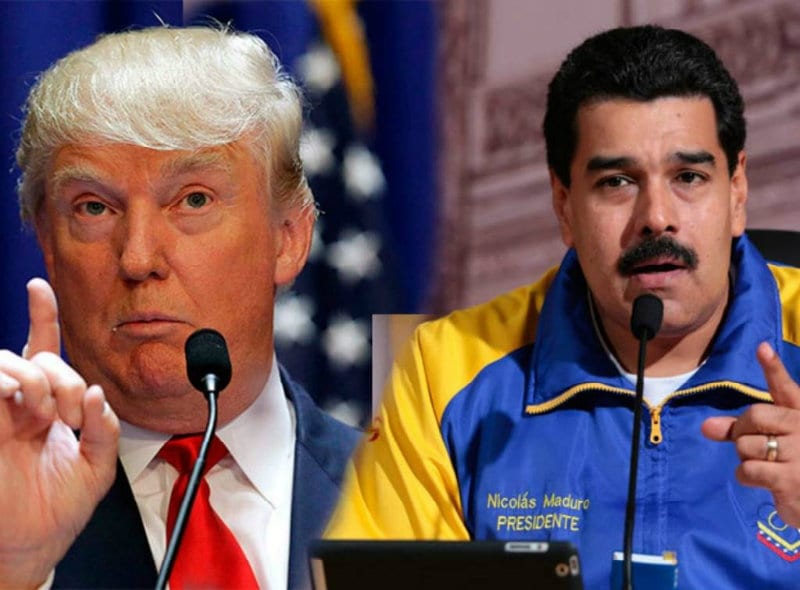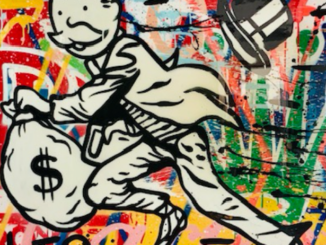
WASHINGTON/CARACAS – U.S. President Donald Trump imposed new sanctions on Venezuela Friday, labeling President Nicolas Maduro a “dictator”.
Under the new sanctions, U.S. banks are now barred from “dealings in new debt and equity issued by the government of Venezuela and its state oil company, PDVSA,” the White House said in a statement.
“It also prohibits dealings in certain existing bonds owned by the Venezuelan public sector, as well as dividend payments to the government of Venezuela,” it said.
Maduro asks Pope for help in face of Trump’s military threat
The sanctions were passed as part of an executive order, in which Trump accused Maduro of depriving “the Venezuelan people of food and medicine, imprison[ing] the democratically-elected opposition, and violently suppress[ing] freedom of speech”.
The order is Washington’s biggest sanctions blow to date against Maduro and is intended to punish his leftist government for what Trump has called an erosion of democracy in the oil-rich country, already reeling from an economic crisis.
Venezuelan President Nicolas Maduro vowed to prosecute for treason opponents he accused of being behind new financial sanctions that will strain relations between the countries and make it harder for the socialist leader to raise badly needed cash.
Maduro accused Trump of trampling on international law and relations with Latin America by taking actions that he said would cause “great damage” to the Venezuelan oil economy as well as American investors who own the country’s bonds.
He singled out the president of Venezuela’s congress, Julio Borges, as being the “mastermind” of the financial and economic “blockade” and called on the government-stacked supreme court and a new, all-powerful constitutional assembly to initiate proceedings against opponents who have lobbied in favor of the sanctions.
“You’ve got to be a big traitor to your country to ask for sanctions against Venezuela,” Maduro said in a televised appearance.
Venezuela’s Constituent Assembly ratifies Maduro as President
The sanctions also ban trading in two bonds the socialist government recently issued to circumvent its increasing isolation from Western financial markets.
They also restrict the Venezuelan oil giant’s U.S. subsidiary, Citgo, from sending dividends back to Venezuela — a move that Maduro said would lead to the “virtual closure” of a company responsible for thousands of American jobs.
“They’re committing robbery, fraud,” Maduro said, adding that Venezuela would reach out to its U.S. partners to make sure decades of business relationships aren’t broken. If necessary the government would find new markets for the roughly 700,000 barrels of oil it sends daily to the U.S., he said.
Trump officials stressed that by leaving untouched crude shipments between the United States and Venezuela the sanctions were targeting Maduro and his allies, not the Venezuelan people.
“Maduro may no longer take advantage of the American financial system to facilitate the wholesale looting of the Venezuelan economy at the expense of the Venezuelan people,” U.S. Treasury Secretary Steven Mnuchin said on Friday.
The sanctions follow through on Trump’s threat last month that he would take strong economic actions if Maduro’s increasingly authoritarian government went ahead with plans to create a constitutional assembly that is made up wholly of government loyalists. The opposition boycotted the vote to elect the body’s 545 delegates.
The sanctions are bound to worsen a crisis that has already seen Venezuela’s oil-dependent economy shrink by about 35 percent since 2014 — more than the U.S. economy did during the Great Depression. But it’s unclear how quickly the impact on the streets will be felt.
Russia says military intervention in Venezuela crisis ‘unacceptable’
Maduro is already struggling to combat widespread shortages and triple-digit inflation as oil production has tumbled to its lowest level in more than two decades. Any economic sanctions, however mild, increase the risk of a default on Venezuela’s ballooning debt.
The government and state oil company have about $4 billion in debt payments coming due before the end of the year but only $9.7 billion in international reserves on hand, the vast majority consisting of gold ingots that are hard to trade immediately for cash.
Venezuela has taken desperate steps to remain current on its debt throughout the economic crisis, and the president has blamed his enemies for spreading rumors about any impending default.



